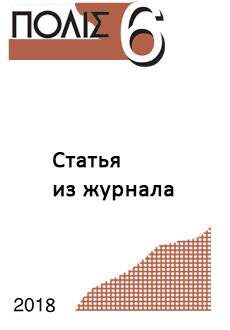Online shop of "Polis. Political Studies" Journal
We in the world, the world in us
Bartenev V.I. Foreign Aid and Quality of Governance: Shattering Illusory Correlations. – Polis. Political Studies. 2018. No 6. P. 67-79 (In Russ.)
150 руб.
statehood; failed states; fragile states; state-building; states of fragility; resilience; securitydevelopment nexus..
This paper examines the current state of academic discourse on linkages between foreign aid and quality of governance in developing countries. The first section summarizes the arguments of the researchers who claim that foreign aid has a generally positive impact on the quality of institutional governance in the recipient countries. The second and third sections outline the counterarguments of scholars holding the opposite view. These counterarguments appeal either to general negative consequences of providing any resources in the form of foreign aid or to more specific risks related to certain aid modalities. Special attention is paid to explaining the cacophony of scholarly interpretations and to outlining the most promising trajectories for a future research. The conclusion is drawn that the ambivalence of empiric assessments stems not from the variations in data samples but from the methodological deficiencies generating illusory correlations. The willingness of most scholars to build abstract theoretical models of universal applicability raises serious concerns because of their inclination towards reductionism and the use of aggregated data on gross volumes of official development assistance. The latter factor leads to ignoring several parameters – first, substantial differences between aid types, instruments, modalities and channels; second, the flows of non-ODA military and security assistance which has been playing an increasingly important role in the international state-building efforts, and third, aid flows from emerging donors, particularly China, which neither report to the OECD DAC nor use policy conditionality. However, the methodological deficiencies should be eliminated not by oversaturating the quantitative models with extra variables and running complex regressions but by getting the most of qualitative case studies. Such studies should apply rather unusual – for reports commissioned by development agencies – methodology with making new theory-based hypotheses and examining assistance provided by different donors in several similar country contexts, while bringing together development scholars and area specialists with a deep knowledge of political systems and cultures in specific regions.
 English
English Русский
Русский

Reviews
There are no reviews yet.